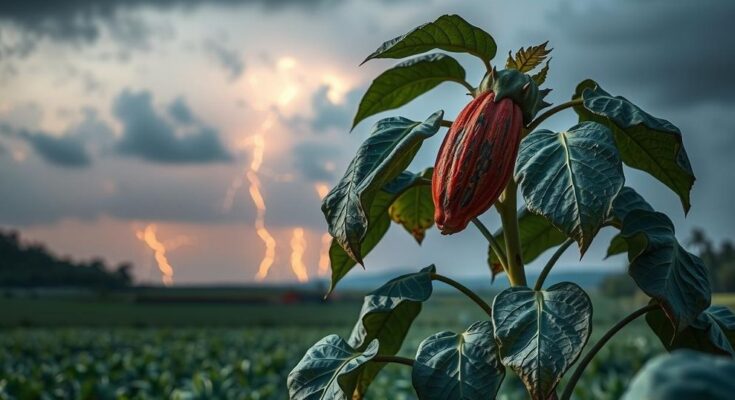Climate change threatens the availability of chocolates for Valentine’s Day as erratic weather has impacted cocoa production in major growing regions like Ghana and Ivory Coast. A 400% increase in cocoa prices was reported due to adverse weather conditions affecting harvests. Christian Aid urges action to reduce emissions and provide financial assistance to farmers.
Climate change poses a serious threat to the traditional gift of chocolates for Valentine’s Day, as highlighted by a warning from the charity Christian Aid. Erratic weather patterns and rising global temperatures have adversely affected cocoa harvests in major growing regions, leading to sharply increased prices and uncertainty for farmers in the industry.
In the last year, cocoa prices have surged by 400% due to adverse weather conditions like droughts and floods, which have significantly hindered cocoa production. This decline in availability has also resulted in smaller chocolate bar sizes on the market.
The primary cocoa-producing countries, Ghana and Ivory Coast, which together supply over half of the world’s cocoa, have faced challenges from severe rainfall and drought conditions. The UN reported that the drought of 2024 affected over a million individuals, leading to substantial crop losses and soaring food prices.
A detailed analysis indicates that climate change has intensified temperature extremes in West Africa’s cocoa belt, where cocoa is grown across Ghana, Ivory Coast, Cameroon, and Nigeria. Over the past decade, the region has experienced an increase in days with maximum temperatures exceeding 32 degrees Celsius, rendering conditions increasingly detrimental to cocoa cultivation.
Farmers worldwide are grappling with the ramifications of climate change, as illustrated by the plight of Guatemalan cocoa grower Amelia Pop Chocoj, whose plantations are suffering due to water scarcity. She expressed her deep concern, noting that crop losses due to climatic factors are not a future threat but a current reality.
Christian Aid is advocating for urgent measures to reduce emissions from fossil fuels and other sources fueling climate change. Additionally, they emphasize the need for financial resources specifically aimed at aiding cocoa farmers in adapting to the evolving climate.
The impact of climate change has also alerted UK chocolatiers, who warn that smaller manufacturers may face significant challenges or potential closure. Andy Soden of Kernow Chocolate indicated that wholesale prices are nearing retail price levels due to these pressures, expressing frustration over the widespread repercussions of climate change on the chocolate industry.
Osai Ojigho, the Director of Policy and Public Campaigns at Christian Aid, underscored the significance of cocoa farming for impoverished communities globally. She called for a concerted effort to cut greenhouse gas emissions and allocate financial support to assist cocoa growers in adapting to these challenging conditions.
In conclusion, climate change represents a formidable threat to the cocoa industry, with far-reaching implications for farmers and the global chocolate market. The significant rise in cocoa prices, coupled with adverse weather conditions affecting harvests, underscores the urgent need for action to mitigate climate change and support affected communities. By investing in targeted climate finance and reducing emissions, stakeholders can help secure the future of cocoa farming and its vital contribution to the livelihoods of many.
Original Source: www.perspectivemedia.com




